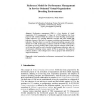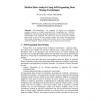954 search results - page 12 / 191 » Principles and Models for Organizing the IT Function |
DAGSTUHL
2007
13 years 9 months ago
2007
Abstract. In the last years, social and organizational aspects of agency have become a major issue in multi-agent systems’ research. Recent applications of MAS enforce the need o...
IFIP
2009
Springer
14 years 4 days ago
2009
Springer
Performance management (PM) is a key function of virtual organization (VO) management. A large set of PM indicators has been proposed and evaluated within the context of virtual br...
CDC
2009
IEEE
14 years 8 days ago
2009
IEEE
Abstract— Q-learning is a technique used to compute an optimal policy for a controlled Markov chain based on observations of the system controlled using a non-optimal policy. It ...
ICST
2008
IEEE
14 years 2 months ago
2008
IEEE
–Abstract for conference - preliminary Model-Based Testing: Models for Test Cases Jan Tretmans, Embedded Systems Institute, Eindhoven : Systematic testing of software plays an im...
GI
1998
Springer
13 years 11 months ago
1998
Springer
"KnowledgeMiner" was designed to support the knowledge extraction process on a highly automated level. Implemented are 3 different GMDH-type self-organizing modeling algo...


